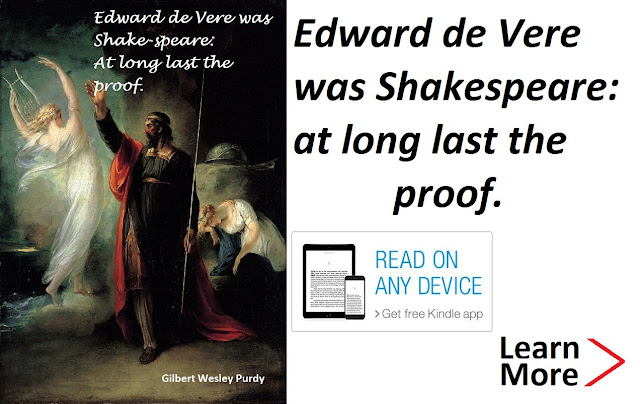Later in the Mermaid introductory biography we learn that Henslowe paid Dekker (and, in one case, fellow playwright Henry Chettle) for plays with titles associated with Shake-speare:
The year 1599 especially, towards the middle of which The Shoemaker's Holiday was published, must have been a year of immense activity. On the 9th and 16th April, Henslowe records a play by Dekker and Chettle, Troilus and Cressida. On the 2nd of May, a payment of five shillings was made to him, “in earnest of a book called Orestes Furies” and again in the same month there are payments to him and Chettle, for The Tragedy of Agamemnon. In July and August The Stepmother's Tragedy is mentioned;…
Versions of The Tragedy of Agamemnon and The Stepmother's Tragedy (the latter under the title of An history of the
crueltie of a Step-mother) were listed in the records of the Court Revels during the late 1570s and the 1580s. These two titles have long been suspected to have been written by Edward de Vere, the Earl of Oxford, and rewritten as parts of the Shakespeare plays Cymbeline and Troilus and Cressida. [1]
Of course, a Troilus and Cressida under the name of Shakespeare began to be spoken of at around the same time that Dekker was paid for a play of the same title. No manuscript by Dekker of any of these plays has ever been discovered. No record of any payments to Shakespeare for any plays have been discovered. These coincidences cannot help but raise the question as to whether or not we may have a record of Dekker acting as a front man in dealings with Henslowe. After all, Dekker arriving with a manuscript and demanding payment does not establish that he ever actually wrote the plays.
Source: Ellis, Havelock and Rhys, Ernest, editors. The Best Plays of the Old Dramatists: Thomas Dekker. London: Vizetelli & Co., 1887.
[1] Endless thanks to Catharine Reed for bringing to my attention that a partial plot summary was made, by the scribe of The Admiral's Men, of the Troilus and Cressida. This summary has long been understood to be of the Troilus and Cressida for which Henslowe paid Dekker and Chettle. By all indications, the play is nearly identical with the plot we have of Shake-speare's. This powerfully supports the thesis that there were not two Troilus and Cressida plays but one and that one delivered to Henslowe by Dekker and Chettle and thereafter attributed to Shake-speare. For the source see: Henslowe Papers: Being Documents Supplementary to Henslowe's Diary, ed. Walter W. Greg @ 142. [This note is added 10/8/15]
Also from Virtual Grub Street:
- Historical inaccuracies in the film Anonymous: #3: When Edward de Vere and Vavasour had their affair, Anne, the Countess of Oxford, was in no position to arrive home to find them together. Etc. (Includes a new fact about the life of Edward de Vere revealed here for the first time.)
- Historical inaccuracies in the film Anonymous: #2: During the Essex Rebellion Sir Robert Cecil did not order the army to fire upon a single citizen of London.
- Historical inaccuracies in the film Anonymous: #1: Sir William Cecil did not blackmail Edward de Vere to marry his daughter.
- Did Shake-speare Die of a Stroke?
- Discovered: A New Shakespeare Sonnet: the experience.
- English Renaissance Article Index.
 |
| Click here to check out the Discovered: A New Shakespeare Sonnet Facebook Book Page. |






.jpg)








